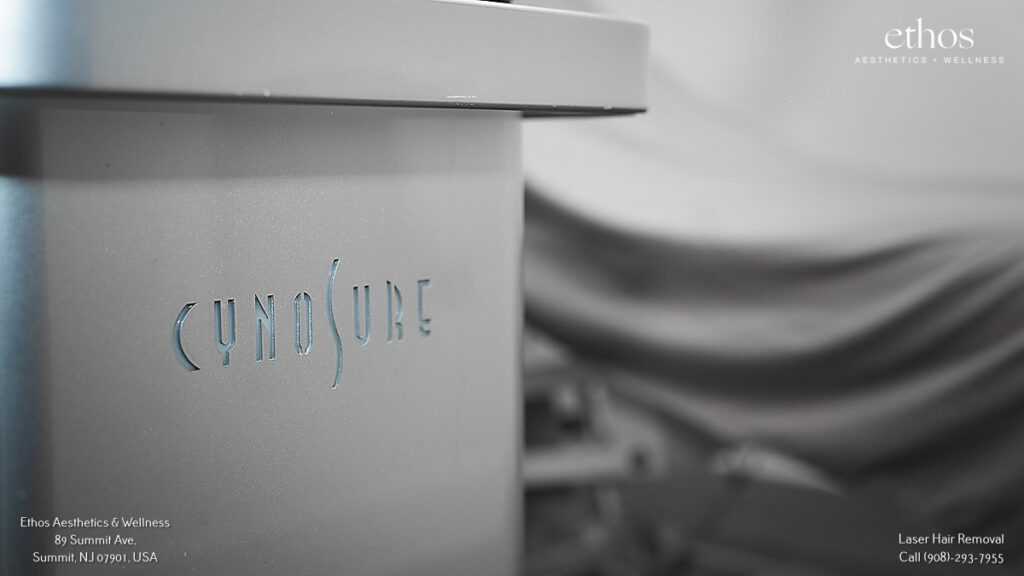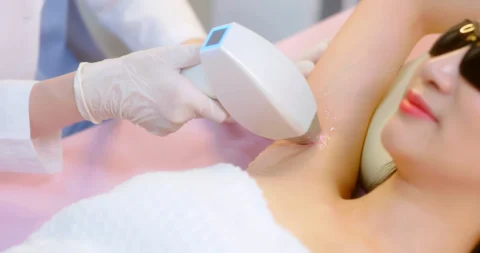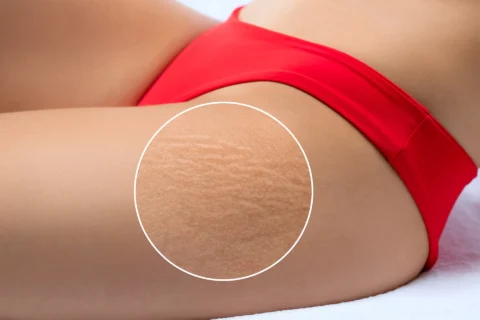Discover the truth about laser hair removal and infertility. Find out everything you need to know before getting the treatment.
Considering laser hair removal but worried about its potential impact on your fertility is like walking a tightrope, balancing your desire for smooth, hair-free skin with concerns about reproductive health.
There’s a lot of conflicting information out there, and it’s essential to separate fact from fiction.
So, can laser hair removal cause infertility? This article will explore this question in detail, providing you with the information you need to make an informed decision.
Let’s unravel the truth behind this popular cosmetic procedure and its potential effects on fertility.
Unlock the Confidence in Your Skin Journey at Ethos Aesthetics + Wellness – Choose Laser Hair Removal with Peace of Mind!
How Laser Hair Removal Works

If you’re considering laser hair removal, it’s important to understand the procedure and what to expect during your sessions. The process involves a concentrated beam of light targeting and destroying hair follicles.
It’s vital to choose a qualified healthcare professional to ensure safety and effectiveness. Multiple sessions are necessary for optimal results.
The science behind laser hair removal lies in the laser’s ability to damage the hair follicle’s pigment, inhibiting future growth. During the procedure, a cooling gel is applied to protect the skin, and you may feel a sensation similar to a rubber band snapping against your skin.
It’s normal for the treated area to be red and swollen for a few days afterward. Understanding the procedure is crucial for a successful and satisfying experience with laser hair removal.
Clearing up the Myths: Does Laser Hair Removal Really Affect Fertility?
Now that you understand the procedure for laser hair removal, let’s address some common myths and misconceptions surrounding its impact on fertility.
There’s no scientific evidence to suggest that laser hair removal directly affects fertility. The laser targets the skin’s surface, pigment, and hair follicles, not internal organs or reproductive systems. It doesn’t cause infertility. It’s a myth without any scientific basis.
While laser hair removal may have potential side effects such as skin irritation or changes in texture, it doesn’t pose a risk to fertility.
Can Laser Hair Removal Harm My Ability To Get Pregnant?
Concerns about the impact of laser hair removal on your ability to conceive are unfounded, as there is no scientific evidence supporting a connection between the procedure and fertility issues.
The laser used in hair removal only affects the skin’s surface, pigment, and hair follicles, not internal organs or ovaries. To further reassure you, here’s a breakdown of the potential risks and precautions associated with laser hair removal:
| Potential Risks and Precautions | Description |
| Side Effects | Side effects may include mild swelling, redness, and skin irritation. Rare effects like blistering, scarring, or changes in skin texture can occur, along with eye injury and infection risk. |
| Precautions | Limited evidence suggests infertility risk; precautions include evaluating skin and hair types. Avoid hair epilation before the procedure, prevent sunlight exposure post-treatment, and avoid near eyes or during pregnancy. |
| Number of Sessions | Two to six sessions are typical, with intervals based on hair growth location. No evidence suggests infertility risk increases with the number of sessions. |
| Factors Influencing Fertility Risks | Limited evidence on fertility risks; some suggest potential impact in the bikini area. No scientific proof links laser hair removal to infertility; main side effects include skin texture changes. |
Will Laser Hair Removal Hurt My Chances of Becoming a Father?
Laser hair removal doesn’t impact your chances of becoming a father, as it only affects the skin’s surface and hair follicles, not internal organs or reproductive capabilities.
Scientifically, there’s no evidence to suggest that laser hair removal can directly impact fertility.
The procedure targets the pigment in the hair follicle, and the laser’s heat penetrates just below the skin’s surface. It doesn’t reach internal organs or affect sperm production.
Therefore, you can confidently pursue laser hair removal without worrying about its impact on your ability to become a father.
The main potential side effects to consider are mild swelling, redness, and skin irritation, along with rare effects such as blistering and scarring.
As long as you follow the necessary precautions and consult with a qualified healthcare professional, undergoing laser hair removal shouldn’t hinder your chances of fatherhood.
Can Laser Hair Removal Worsen PCOS Symptoms or Affect Fertility?

While laser hair removal doesn’t directly worsen PCOS symptoms or affect fertility, it’s essential to consider individual factors. PCOS can cause excessive hair growth, requiring more frequent sessions, but it’s crucial to consult with a healthcare professional to tailor the treatment.
There’s no scientific evidence linking laser hair removal to infertility. The procedure targets hair follicles and doesn’t affect internal organs or eggs. Although potential side effects like skin irritation and hormonal changes may indirectly impact fertility, these are typically manageable.
It’s important to prioritize your well-being and consult with a qualified professional to address any concerns and ensure personalized care.
Are There Any Long-Term Risks of Laser Hair Removal on Future Fertility?
Long-term risks of laser hair removal on future fertility are a topic of interest for individuals considering the procedure.
While there’s no scientific evidence to suggest that laser hair removal directly impacts fertility, it’s important to consider potential side effects that could indirectly affect future fertility.
Here’s what you need to know:
- Scientific Basis: No scientific basis supports the idea that laser hair removal causes infertility.
- Other Potential Side Effects: Side effects may include mild swelling, redness, and skin irritation. Rare effects like blistering, scarring, or changes in skin texture can occur, along with eye injury and infection risk.
- Precautions to Minimize Risks: Limited evidence suggests infertility risk; precautions include evaluating skin and hair types, avoiding hair epilation before the procedure, preventing sunlight exposure post-treatment, and avoiding treatment near eyes or during pregnancy.
Secure Your Future Fertility – Choose Ethos Aesthetics + Wellness for Laser Hair Removal with Proven Safety and Expertise.
Is There Scientific Evidence That Laser Hair Removal Affects Fertility?
Scientific evidence does not support the notion that laser hair removal affects fertility. Despite some potential side effects like skin irritation and hormonal changes, there is no direct link between laser hair removal and infertility.
Here’s a table highlighting the key points about the impact of laser hair removal on fertility:
| Factors | Impact on Fertility | Scientific Basis |
| Number of Sessions | No increased risk | Limited evidence |
| Hair & Skin Types | No significant impact | Evaluation required |
| Location of Treatment | Limited potential risk | Bikini area mainly |
Laser hair removal primarily affects the skin’s surface and hair follicles, with minimal risk to fertility. Any concerns should be discussed with a healthcare professional for personalized guidance.
What Are Natural Alternatives to Laser Hair Removal if I’m Worried About Fertility?

If you’re concerned about fertility and considering natural alternatives to laser hair removal, there are several options that you can explore. Here are some natural alternatives to laser hair removal that you can consider:
- Waxing: This method involves applying a layer of wax to the skin, allowing it to harden, and then pulling it off in the opposite direction of hair growth. It provides longer-lasting results compared to shaving.
- Sugaring: Sugaring is similar to waxing but uses a sticky paste made from sugar, lemon juice, and water. It’s a gentle and natural hair removal method.
- Threading: This ancient technique uses a twisted cotton thread to trap and lift hair out of the follicle. It’s a precise method commonly used for facial hair removal.
These natural alternatives offer effective hair removal without the potential concerns associated with laser hair removal.
Is Laser Hair Removal on My Abdomen Safe for My Reproductive Health?
Considering laser hair removal on your abdomen? Let’s explore how it may impact your reproductive health.
Laser hair removal on the abdomen is generally considered safe and doesn’t pose a direct risk to your reproductive health. The procedure targets hair follicles just below the skin’s surface using light energy, which doesn’t reach internal organs or eggs. Therefore, it doesn’t affect fertility.
However, as with any cosmetic procedure, there are potential side effects to consider, such as mild swelling, redness, and skin irritation. It’s essential to choose a qualified healthcare professional to minimize any risks.
If you have concerns, consulting with a healthcare provider can provide personalized advice based on your specific health and medical history.
Rely on Science, Choose Ethos – Schedule Your Laser Hair Removal Consultation for Unbiased Guidance.
Which Type of Laser Hair Removal Is Safest for Women Who Want To Get Pregnant?
For women who want to get pregnant, the safest type of laser hair removal is one that targets the hair follicles just below the skin’s surface without reaching internal organs or eggs. When considering laser hair removal, it’s important to opt for procedures that specifically focus on the hair follicles without penetrating deeper layers of skin.
To ensure the safest laser hair removal for women planning for pregnancy, consider the following:
- Surface-Level Targeting: Look for laser hair removal treatments that explicitly mention targeting hair follicles just below the skin’s surface.
- Specialized Professionals: Seek out qualified healthcare professionals with expertise in laser hair removal for women looking to prioritize their reproductive health.
- Avoidance of Internal Organs: Ensure that the laser hair removal procedure explicitly avoids reaching internal organs or eggs, providing a safe option for women planning for pregnancy.
How Can I Manage Unwanted Hair During Pregnancy Without Harming My Baby?
You can safely manage unwanted hair during pregnancy without harming your baby by using gentle hair removal methods approved by healthcare professionals.
Opt for options like shaving, tweezing, and using hair removal creams that are considered safe during pregnancy.
Shaving is a quick and easy way to get rid of unwanted hair, just be cautious to prevent any cuts or nicks.
Tweezing is suitable for small areas and can help maintain eyebrows and upper lip hair.
Hair removal creams should be used in well-ventilated areas and only for the recommended duration to minimize any potential absorption through the skin.
Always consult with your healthcare provider before trying any new hair removal method to ensure it’s safe for you and your baby.
Should I Postpone Laser Hair Removal Until After I Complete My Family?
If you’re planning to start a family in the near future, you may be wondering whether it’s best to postpone laser hair removal until after you have completed your family.
Here’s what you should consider:
- Family Planning: If you’re actively trying to conceive, it may be wise to hold off on laser hair removal treatments until after you have achieved your family planning goals.
- Hormonal Changes: Pregnancy and postpartum periods involve significant hormonal fluctuations, which can affect hair growth patterns. It may be beneficial to wait until after this phase to undergo laser hair removal.
- Personal Preferences: Ultimately, the decision to postpone laser hair removal is a personal one. Considering your family planning timeline, hormonal changes, and personal preferences will help you make an informed choice.
Frequently Asked Questions on Laser Hair Removal Side Effects on Infertility
Can Laser Hair Removal Worsen PCOS Symptoms or Affect Fertility?
Laser hair removal doesn’t worsen PCOS symptoms or affect fertility. The procedure targets hair follicles, not internal organs. Potential side effects like skin irritation don’t directly impact fertility. Consult a professional for personalized advice.
Are There Any Long-Term Risks of Laser Hair Removal on Future Fertility?
Laser hair removal doesn’t pose long-term risks on future fertility. It targets hair follicles and doesn’t affect internal organs or eggs. Potential side effects include skin irritation, not infertility. Seek a qualified professional for safe treatment.
What Are Natural Alternatives to Laser Hair Removal if I’m Worried About Fertility?
If you’re worried about fertility and want natural alternatives to laser hair removal, consider options like sugaring, waxing, or using an epilator. These methods can effectively remove hair without the use of lasers.
Is Laser Hair Removal on My Abdomen Safe for My Reproductive Health?
Yes, laser hair removal on your abdomen is safe for your reproductive health. The procedure targets hair follicles and does not affect internal organs. It’s important to choose a qualified professional for the best results.
How Can I Manage Unwanted Hair During Pregnancy Without Harming My Baby?
During pregnancy, avoid laser hair removal. Opt for safe hair management methods like shaving or using depilatory creams. Always consult your healthcare provider before trying any hair removal method to ensure the safety of your baby.
Final Thoughts

In conclusion, laser hair removal doesn’t cause infertility. Research shows that the procedure targets hair follicles, not reproductive organs. It’s safe for both men and women who want to start a family.
However, if you’re pregnant or trying to conceive, it’s best to postpone the treatment. Consult with a qualified professional to discuss any concerns and ensure the procedure is done safely.
Don’t let fertility myths hold you back from enjoying the benefits of laser hair removal.
Step into a Future of Confidence – Embrace Laser Hair Removal at Ethos Aesthetics + Wellness, Where Myths Don’t Hinder Your Beauty Journey.







